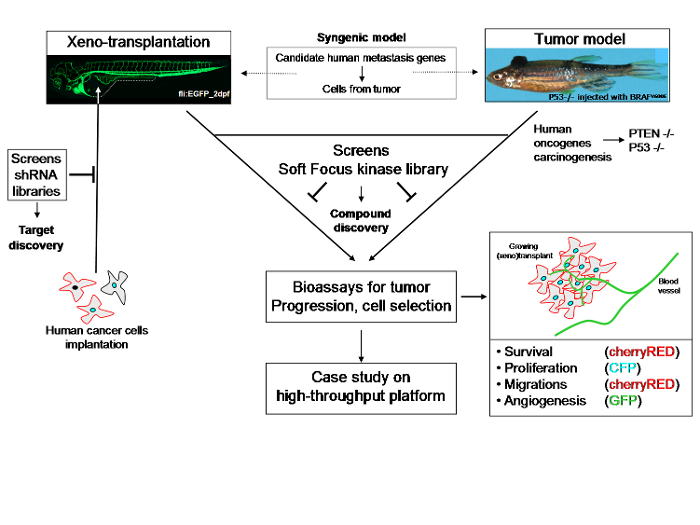Research project
ZF-CANCER - Developing high-throughput bioassays for human cancers in zebrafish
How can zebrafish research help to understand and fight human cancer?
- Duration
- 2008 - 2012
- Contact
- Ewa Snaar-Jagalska
- Funding
-
 European Commission 7th framework programme
European Commission 7th framework programme
- Partners
- Dr. B. Ewa Snaar-Jagalska ( coordinator ) Institute of Biology, Leiden University, The Netherlands
- Dr. Erik Danen, Div.Toxicology, Leiden University, The Netherlands
- Dr. Richard Janssen, Biofocus DPI, a company of Galapagos, The Netherlands
- Dr. Ron Dirks, ZF-screens B.V. Leiden, The Netherlands
- Dr. Elizabeth E. Patton, University of Edinburgh, Scotland, UK
- Prof. Dr. Juan Carlos Izpisua-Belmonte
- Centre de Medicina Regenerativa de Barcelona, Spain
- Prof. Dr. Jeroen den Hertog, Hubrecht Institute, The Netherlands
- Dr. Carl-Philipp Heisenberg, Max Planck Institute, Germany
- Dr. Carles Callol, Biobide, Spain

The ZF-CANCER project coordinated by Dr. Snaar-Jagalska from the IBL aims to develop new bio-imaging high-throughput methodologies of tumor progression, as well as identifying novel gene and drug-lead targets, with the ultimate aim of establishing zebrafish as a key vertebrate model for rapid, preclinical anticancer drug target discovery and lead compound selection.
The ZF-CANCER is a collaborative, medium-scale focused research project funded by the European Commission as part of its Seventh Framework Programme. The ZF-CANCER project is a coordinated effort of five research laboratories, one large company and two SMEs, together aiming for two highly interrelated objectives:
Objective 1: Development of high-throughput bioassays for the simultaneous, in vivo study of tumor progression hallmarks: survival, growth, migration and angiogenesis.
Objective 2: Discovery of genetic targets and novel lead compounds that control specific aspects of cancer progression using shRNA and chemical libraries.

Recently the zebrafish has emerged as a new important system for cancer research because the zebrafish genome contains all orthologs of human oncogenes and forms tumors with similar histopathological and gene profiling features as human tumors.
The zebrafish provides an in vivo vertebrate model for identifying novel mechanisms of cancer progression and for development of new anticancer compounds in a time- and cost-effective manner.
The ZF-CANCER project aims to develop clinically relevant high-throughput bioassays for cancer progression that will be applicable in preclinical validation pipelines, and to use these bioassays to screen for novel chemical and genetic cancer targets. Fluorescently labelled human and zebrafish cancer cells will be implanted (xenogenic and allogenic transplantation) into zebrafish embryos to generate quantitative, multi-colour fluorescent intravital bio-imaging of tumor progression. Because of the availability of many transgenics and optical transparency zebrafish is a powerful - and the only extant - vertebrate model that allows the simultaneous, in vivo imaging of cancer progression hallmarks including cell survival, proliferation, migration and angiogenesis. The visual, non-invasive monitoring of cancer cells in transparent host embryos coupled with RNA interference technology will enable the identification of novel gene targets that drive tumor progression in a range of cancers. Automation of these fluorescent readouts, and other cancer gene specific readouts, will accelerate the screening process of chemical libraries for the discovery of new compounds involved in different aspects of cancer progression and inhibition. In our proposed case study, we begin with a select panel of genes and class of compounds and using our established high-throughput platform aim to identify novel anti-cancer drug leads and gene targets relevant for human cancer therapy, with the potential for commercial development.

